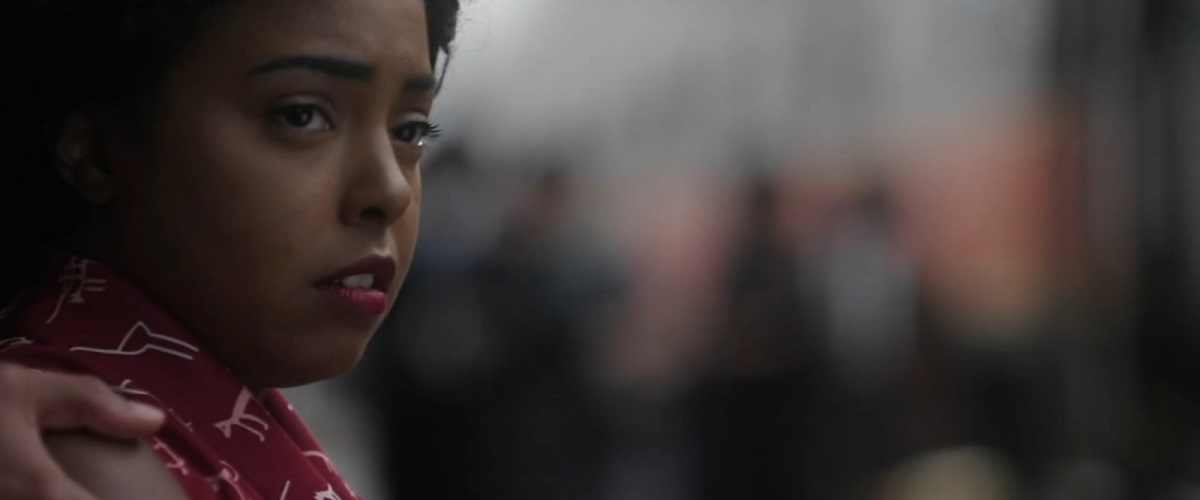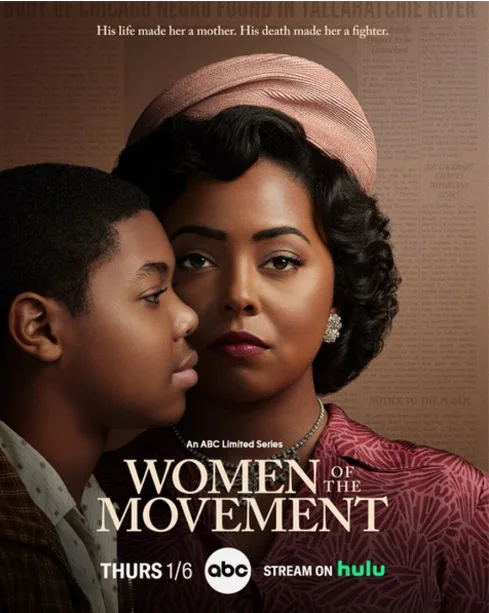A solid if somewhat staid docudrama recounting the murder of Emmett Till and the subsequent legal proceedings, the six-part limited series “Women of the Movement” is the sort of edutainment programming in which the drive to inform supersedes all else, even when it’s to the detriment of artistry and dramatic impact. While still effective on the whole and buoyed by a commanding lead performance from Adrienne Warren as Mamie Till—Emmett’s mother who refuses to let her son and the brutality of his murder be swept under the rug—the series from creator Marissa Jo Cerar suffers from a chronic lack of focus that presents a strange contrast to the clear messaging of its title.
One imagines that the title alludes to this being the first installment of a historical anthology series, like National Geographic’s “Genius” but highlighting female civil rights leaders. But though Mamie Till is undoubtedly the protagonist here, the series is more like an ensemble piece; that Warren even has the most lines or screen time in many of the episodes is doubtful. Meanwhile, prominent civil rights activist and NAACP regional secretary Ruby Hurley (Leslie Silva) has a minor role lacking any significant trajectory or narrative relevance. She feels like a last-minute addition, a band-aid slapped on following a late stage realization that the movement, as depicted in the series, is bizarrely lacking in women save for Mamie. There are also lines sprinkled in about women being the backbone of the movement, and audience shots of Mamie speaking to crowds generally predominated by women, but it all feels more like lip service. When it comes to who is actually given meaningful screen time, the series does not consistently practice what it preaches.
“Women of the Movement” has its merits: it recounts an infuriating key moment in US history with a compelling amount of compassion and historical accuracy, and is able to both not gloss over the horror of Emmett Till’s fate while avoiding a descent into dehumanizing torture porn. But it ultimately does not feel like the most effective version of what it could be. The most effective version of this series is buried under the weight of an overly generic legal drama with overgrown subplots that steal from the momentum and impact of Mamie’s story instead of supporting it. One particularly baffling storyline about two white reporters—one Southern, one Northern—covering the Emmett Till case is so far removed from everything else that the pair are like an ineffective Greek chorus.
As is unfortunately always the case with anyone whose legacy is tragically the means of their death, Emmett Till’s murder is widely known, but his identity as a living boy is rarely considered. “Women of the Movement” makes the compelling choice to spend a significant portion of the first episode introducing Emmett Till (Cedric Joe) as a goofy, affectionate boy; a sharp dresser who endearingly if ineffectively tries to impress girls and wants to go on adventures with his cousins and is known to those who love him as Bobo. The foreshadowing then becomes aggressive—promising he will have “the time of his life” in Mississippi, discussing how he will make some woman “very happy someday.” Here again the series indicates promising intentions and then oddly undermines those intentions. It takes the pointed stance of introducing and spending time with Emmett as a child with hopes and dreams, but then never misses an opportunity to emphasize his rapidly approaching demise with the subtlety of a flashing neon sign.
Turner shines as Mamie when given the opportunity, but though the series is presumably about her, there are significant stretches where she has little to work with; many of her scenes have to accomplish so much narratively that they inevitably become dramatically void. Especially once the legal drama takes over—most of the back half of the series up until the final episode—the vast majority of Mamie’s screen time is devoted to speeches and discussions of strategy that leave little space for character. Throughout this time, visions of Emmett quietly watching over her prove to be a crutch for her emotional turmoil. Mamie’s personal journey becoming secondary for a significant chunk of the series is particularly evidenced by how Mamie’s mother Alma (Tonya Pinkins) and supportive boyfriend, Gene Mobley (Ray Fisher), also more or less disappear from the narrative for this period, reappearing midway through the final episode to quickly wrap up arcs that had been left by the wayside several episodes earlier.
Considering the caliber of the directing talent involved, including Gina Prince-Bythewood and Julie Dash, the look of the series is rather nondescript. But this sparsity does make more pointed visual choices stand out, like when Carolyn Bryant (Julia McDermott), the white woman who accused Emmett of whistling at her, leading to his murder at the hands of her husband and brother-in-law, takes the stand. Her weaponized white tears are contrasted to Mamie’s, silent and ignored, through alternating close-ups of the two women. (This sequence also stands out because early episodes in particular seem weirdly allergic to close-ups, even in deeply emotional moments.)
The shortcomings of “Women of the Movement” trace back to the issue of focus, a flaw that feels connected to the show’s edutainment aims, and an issue rather endemic to the docudramas as a whole. The genre is plagued by a strange respectability politics of a sort, a desire to maintain a veneer of impartiality and veracity that has somewhere along the line been (in my opinion, falsely) tied to a particular sense of distance, minimal aesthetics, and dry dialogue crammed with exposition. It’s like watching a textbook. It’s a strange conundrum, as it’s the very moments that wouldn’t be in a textbook that hit the hardest in this series, like when the whirlwind of trauma and the legal proceedings calms down and Mamie sobs over a broken washing machine. There are just enough of these moments scattered throughout the series to drive home what a shame it is that there aren’t more of them.
If “Women of the Movement” does prove to be the first installment of an anthology series, one can hope that it becomes unafraid to have more of a subjective perspective, takes more advantage of the possibilities of a drama series, and really communicates personal experiences in the way a textbook cannot. The series succeeds in being a watchable history lesson, but it feels like a format with the potential to be so much more.
“Women of the Movement” premieres on ABC on January 6, 2022 at 8/7c. All six episodes were screened for review.




















